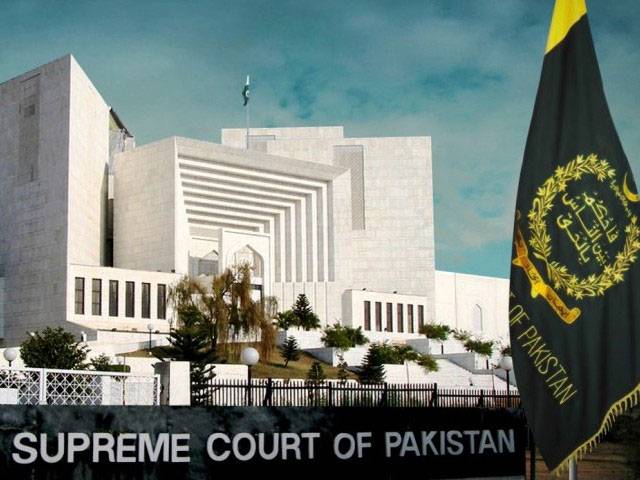ISLAMABAD - The Supreme Court Monday rejected federation’s request for a full court to hear the petitions challenging recently-passed contempt of court law and the chief justice observed that parliament cannot curtail apex court’s powers.
A five-judge bench of the apex court comprising Justice Iftikhar Muhammad Chaudhry, Justice Shakirullah Jan, Justice Khilji Arif Hussain, Justice Jawad S Khawaja and Justice Tassadduq Hussain Jilani heard 26 identical constitutional petitions filed against the new law.
Representing the federation, Abdul Shakoor Paracha requested that the case be heard by the full court and that the federation be given one or two weeks to respond the petitions. Attorney General Irfan Qadir also requested the court for a period of two weeks, saying that the case was unprecedented in the country’s legal history.
Rejecting Pracha’s plea for the full court, Justice Chaudhry said the three-member bench, which held a preliminary hearing, had decided that a five-member bench will conduct hearing; the bench comprises all senior judges. Moreover, he said the court had already given ample time to the federation, adding that the issue was significant and a timely decision over it was important.
The CJ also said that a case of similar nature had been heard in 1996 by a four-judge bench headed by Ajmal Mian, the then chief justice of the Supreme Court. The attorney general said the world legal concepts have undergone change ever since 1996, adding that Justice Ajmal had held that the constitution actually commands in contempt of court cases.
Counsel for petitioner Baz Muhammad Kakar argued that the judiciary’s independence was guaranteed in the preamble to the constitution. Ikram Chaudhry, counsel for petitioner Siddique Baloch, said the new law violates articles 175 and 204. He said the CoC Act 2012 was another NRO (national reconciliation ordinance), an amnesty law that had been declared unlawful and annulled by the supreme court. This new law encroaches upon the independence of judiciary, he added.
Chief Justice Iftikhar Chaudhry said that fair comments are welcome on the courts’ judgments as they become public property but the comments should not carry negative notions and must not bring the court or the judges into disrespect. No act by the parliament can slash the jurisdiction of the judiciary, he further remarked.
The court observed that article 204 of the constitution empowers the supreme court to make rules. This rule making power can’t be given to the parliament or the executive, it said, adding that “they can’t start regulating the rule making power”. It noticed that the Contempt of Court Act 2012 is repealing those provisions which have already been repealed.
The CJ said the framers of the constitution had omitted the explanation, containing words like ‘fair comments about the working and decisions of the courts’ from article 204 of the 1973 Constitution under 8th amendment. He said those words were not included in 18th 19th and 20th amendments “then how come they appeared in the new Act”.
Justice Jawwad S Khawaja said that all the 26 petitions – filed by lawyers associations, advocates and others – wanted that the new Act should be set aside. He said according to the item 55 of the Federal Legislative List, the powers of the court can’t be enlarged or made to shrink. He remarked that under the new law scandalising a judge is contempt but ridiculing the court is ‘no problem’. He asked Ikram Chaudhry to inform the court as to which sections are contradictory to the article 204 of the constitution. Justice Tassadque Hussain Jillani said: “We’re more concerned with the administration of the justice. If we can’t enforce the judgments then passing of those verdicts was a futile.”
Syed Mehmood Akhtar Naqvi, another petitioner, argued that the new law was passed to protect certain personalities and to curtail the independence of the court. He said that through this law the government wanted to save Prime Minister Raja Pervaiz Ashraf from contempt of court. He said that as the matter was sub judice, the federal cabinet and should not have presented it and the parliament should not have passed it. He prayed the court to suspend the new law immediately and later declared it null and void.
Justice Jilani said that contempt of court laws were an extension of the concept of rule of law. As long as systems of justice prevailed, laws pertaining to contempt of court would continue to exist, he added. The chief justice said that only constitutionally valid changes could be made in the law regarding contempt of court. Subsequently, the court directed the petitioners to conclude their arguments on Tuesday (today) and adjourned the hearing.
SC rejects govt plea for full court
Tuesday, April 16, 2024
SC rejects govt plea for full court

CM Maryam seeks comprehensive development plan for Murree
April 16, 2024
Court remands XEN in FIA custody
April 16, 2024
PML-N believes in ensuring prosperity, says Azma Bukhari
April 16, 2024
Political Reconciliation
April 16, 2024
Pricing Pressures
April 16, 2024
Western Hypocrisy
April 16, 2024
Policing Reforms
April 15, 2024
Storm Safety
April 15, 2024
Democratic harmony
April 16, 2024
Digital dilemma
April 16, 2024
Classroom crisis
April 16, 2024
Bridging gaps
April 16, 2024
Suicide awareness
April 15, 2024
ePaper - Nawaiwaqt
Advertisement
Nawaiwaqt Group | Copyright © 2024





